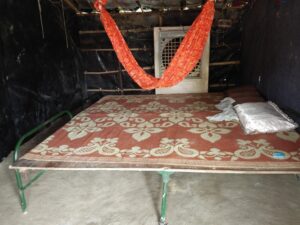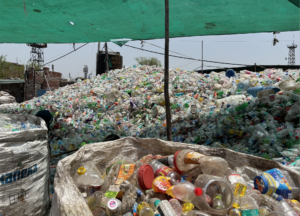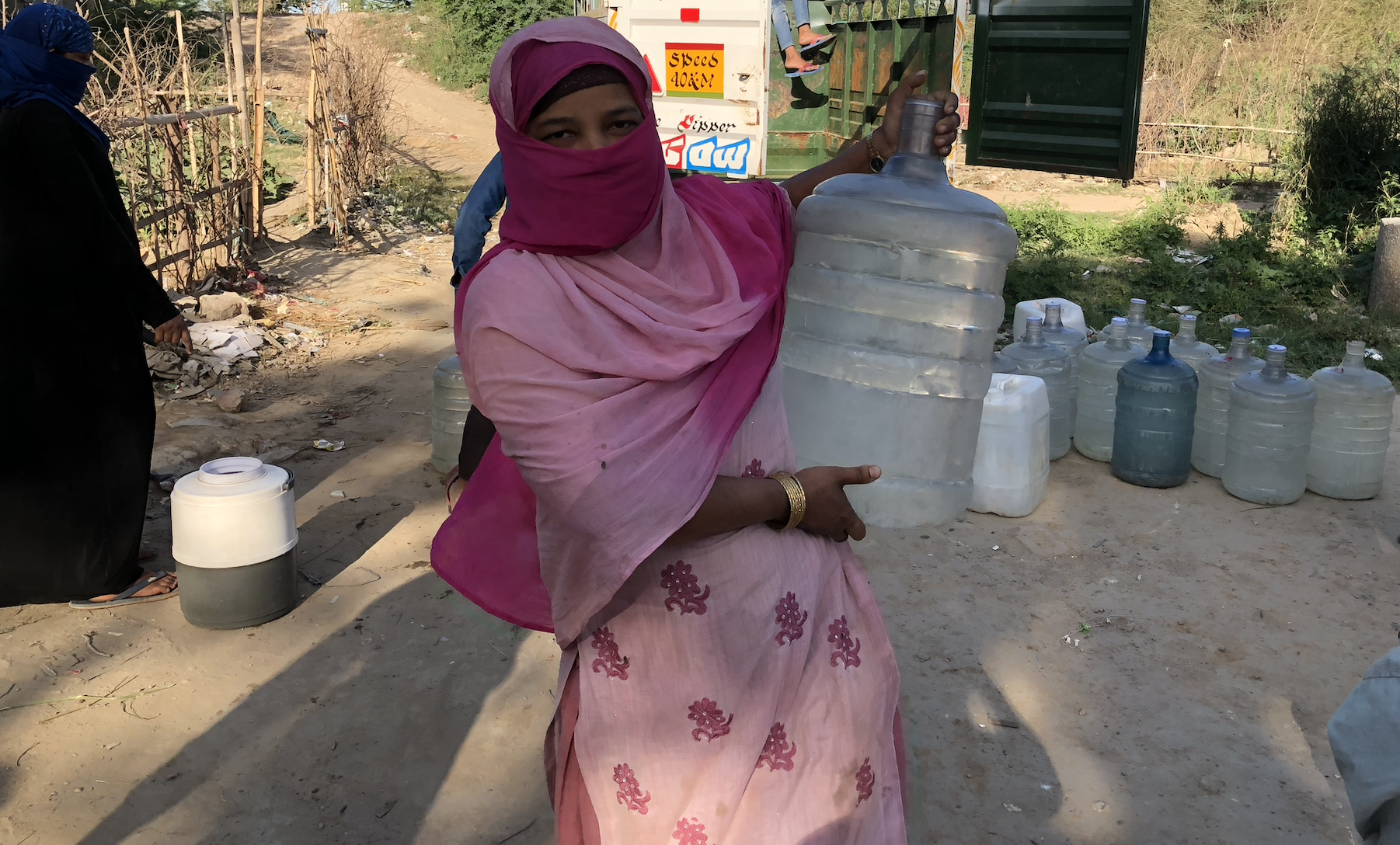“Main jab bhi sunti hun ki paani ka tanker aaya hai to mujhe sunte hi pet me dard hone lagta hai. Lagta hai meri jaan nikal rahi hai” (Whenever I hear that the water tanker has come, I get stomachaches. I feel like I am dying), mentioned Juhi, a displaced migrant woman in New Delhi.
Her words are not just about physical exhaustion but also the weight of survival in a city that has turned unbearably hostile toward its most vulnerable inhabitants.
A six-by-six-foot hut makes up Juhi’s home, pieced together with bamboo, wood, and sheets of tarpaulin. Her settlement has similar houses providing shelter to 30 to 40 families. These houses are lined side by side with narrow lanes so tight that only one person can pass at a time. There is no electricity here, there hasn’t been for over 9 months.
The Weight of Water, The Burden of Survival
“There is a huge shortage of water. The tanker comes just once or twice a week. I carry heavy buckets at least 15 times in the scorching heat. It makes me sick to even think about it, but I have no choice,” she says. “And when the tanker doesn’t arrive, which is often the case, the suffering only deepens”, she adds.
According to the India Meteorological Department (IMD), Delhi is likely to experience record-breaking temperatures throughout the summer of 2025. Heatwave alerts have been issued across the region, warning of prolonged periods of dangerous heat.
The Mental Toll and Invisible Pain
Women like Juhi say their biggest fear isn’t just the heat, but what it brings with it.
“May has just started, and the heat is already unbearable. We’re afraid it will take our lives”, Juhi added. Children are falling ill. Elderly residents are fainting. And in the absence of electricity, mothers stay up all night, terrified of snake bites in the dark. Riza another resident, whispers a chilling truth: “Some newborn babies have died from snake bites in our settlement. The fear keeps us awake all night”.
This constant battle against heat, hunger, illness, and fear is fraying the mental health of already vulnerable women. Riza (a participant in our program) hides her pain behind a faint smile and says, “Hunger and thirst have become a normal part of our lives”. These physical hardships compound into mental distress. Something rarely acknowledged when discussing climate impacts.

Shilpa, a migrant worker from Uttar Pradesh, spends her days sorting plastic in a warehouse under the blazing sun. With no choice but to work outdoors in 42-degree heat, she shoulders the double burden of poverty and climate vulnerability.
“Agar Dhoop men kaam nahin Karenge to Bhook se mar jaayenge” (If we don’t work in the sun, we’ll die of hunger).

This is the brutal reality for thousands of women across Delhi who have migrated with their families in search of work. And yet, they remain invisible in most policies and plans.
A study by the India Housing Report revealed that 86% of migrant workers in Delhi live in precarious, informal housing spaces that offer no protection from heat, no sanitation, and no dignity. And yet, these are the same people who keep Delhi running—from construction sites to domestic work, from cleaning the city’s streets to sorting its waste.
The Climate Crisis is a Justice Crisis
The Delhi government’s Heat Action Plan for 2025 in April, which sounds good on paper, has yet to reach these invisible communities. The plan has failed to translate into water security, electricity access, or health safeguards for those living in slums, and informal housing settlements.
This is a population that has contributed almost nothing to the climate crisis. And yet, they bear the harshest consequences of environmental degradation. They are the first to fall sick, the first to lose sleep, and often, the first to suffer.
What Needs to Change?
India needs more than short-term fixes. We need comprehensive, grassroots-based solutions that not only can be accessed by migrant communities but also sustained as part of their lives. We need sustainable, inclusive solutions that:
- Address the current climate crisis as a social justice issue
- Safe access to water, sanitation, and electricity in informal settlements and houses
- Gender-sensitive heat action planning
- Prioritise the infrastructure and rights of informal settlers
- Listen to the lived experiences of marginalised women who are both climate survivors and frontline warriors
A Future Worth Fighting For
If we want a livable future, we must centre the voices of the most affected. Women like Juhi, Riza, and Shilpa deserve more than survival. They deserve dignity, safety, and the right to live without fear.
We owe them a just climate response, not in policy papers, but in their lanes, huts, and lives.
Blog and photographs by Kaynat Salmani. She is the Senior Programs Manager at The Azadi Project, a gender activist, and a budding photographer. She has accrued 10 years of administrative, direct practice, and research experience in child protection and women’s empowerment. Her hope and determination motivated her to serve children and women worldwide. Now, she brings a unique blend of passion, compassion, and strategy as Senior Program Manager.

Leave a Reply